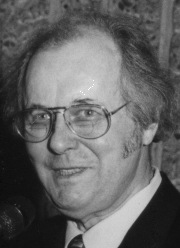Home > News > How Christian existence can be joyful - Interview with Otto Hermann Pesch
How Christian existence can be joyful - Interview with Otto Hermann Pesch
Last year Thomas O'Meara wrote an introduction to Thomas Aquinas theologian. What he did for the Anglo-American world was done ten years earlier for the German speaking regions by Otto Hermann Pesch. Pesch's book has been translated into Spanish, Italian and French; the English speaking Thomists can meet this scholar in this edition of our Website.
What are you doing at this moment? Are you teaching any courses?Since the summer of 1975 I am professor for systematic theology (main point: theology of controversy) at the faculty of evangelical theology of the University of Hamburg. I was the first - and meanwhile: the only again - Roman Catholic theologian in the Federal Republic of Germany who is a member of a evangelical-theological faculty. Since April 1st, 1997 I have been given emeritus status. During the semesters of the summer 1997 until winter 1998/99 I continue to teach in Hamburg as part of a so called 'represention of my subject': four hours a week which I can shape to my liking as lecture or seminar. In order to do this, since the summer of 1998 I travel each week for two days from München to Hamburg. Furthermore I work on two greater book-projects, which I wasn't able to conclude because of the many official loads during my working career. Moreover at this time I have to give many lectures and discussions about the questions of the scheduled 'Common Declaration about the Doctrine of Justification' between the Lutheran World League and the Roman cury.
What research on Aquinas are you doing now?
Currently I am working on a commentary on Aquinas' doctrine of sin for volume 12 of the German Aquinas edition (STh I-II 71-89). The translation of the text is completed, the historical notes are sketched. This commentary is one of the two projects mentioned above.
What is the most important thing you learned from Aquinas?
The challenge of a theology which - contrary to Luther, with whom I occupied myself intensively in the same manner - is 'self-forgotten', this means: which looks with Gods eyes at the world, man and history and which intends to praise Gods works by intellectual penetration into the truth of faith, without at first and at last asking after one's own salvation. Characteristicly: with concern to the most tormenting problem of (Western) history of theology, the question of predestination, Aquinas fears error, Luther despair. See my contribution 'Scholastik - Gottesdient des Denkens', in: Veritas et communicatio. kumenische Theologie auf der Suche nach einem verbindlichen Zeugnis. Festschrift zum 60. Geburtstag von Ulrich Kühn, ed. by Heiko Franke a.o., Göttingen 1992, 187-202.
Aquinas' specific formulation of the doctrine of grace and virtue, in which he intellectually explains how Christian existence can be joyfull, spontaneous and 'easy'. His conception of the doctrine of sin conforms this as 'mirror image' by the way.
What works of Aquinas are you most familiar with?
I would rather give a negative answer: I am not very familiar with Aquinas' pure philosophical works - for reasons of time and despite great interests.
What is the importance of Aquinas-research for our times?
See above. Thus a new 'Theology of the world' beyond fashionable Cosmocentrism and (bad, not real!) reformed Antropocentrism. And a new 'doctrine of virtue', which intends to present in a modern way, how Christian existence can become 'obvious' - which also corresponds to the deepest intentions of Luthers theology by the way. Important in this respect are not the typical Medieval details, but the 'paradigm' of courage, with which Aquinas concerned himself with the questions of his day, using the intellectual tools of his day. In order to avoid mistaken actualisations, substantial Aquinas research is necessary again and again.
What are your expectations of the Thomas Instituut?
I don't know the Institute yet. I would love to get to know it on the next occasion of a journey to Holland.
Which of your books/articles do you consider the most important?
How should one answer a question like that! I wrote three big books especially about Aquinas: Theologie der Rechtfertigung [= justification] bei Martin Luther und Thomas von Aquin. Versuch eines systematischen-theologischen Dialogs, Mainz 1967, 2. Auflage 1985 [sold out in the meantime]; Das Gesetz [= the law] (German Aquinas edition Vol. 13), Graz 1977; Thomas von Aquin. Grenze und Grösse mittelalterlicher Theologie. Eine Einführung [Thomas Aquinas. Bounds and greatness of medieval theology. An Introduction], Mainz 1988, 3. Auflage 1995 - translated into Spanish, Italian and French.
Carlo Leget
